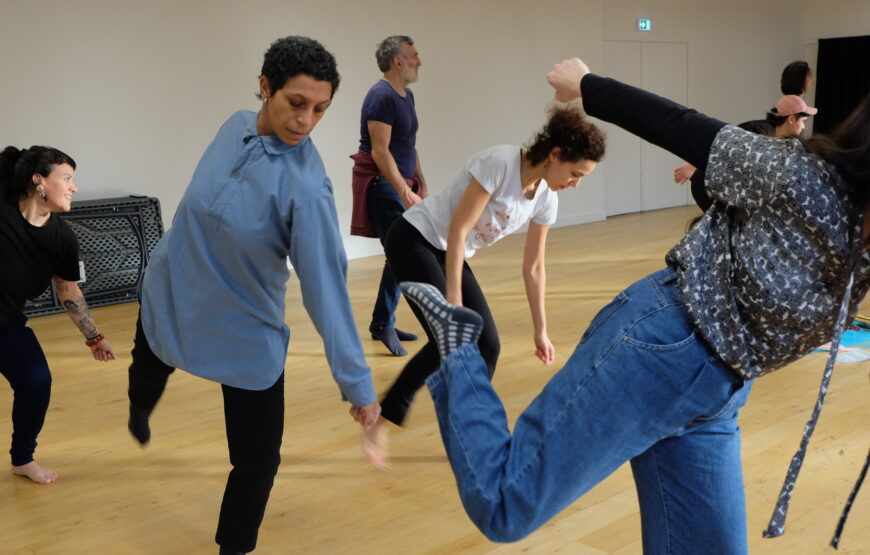
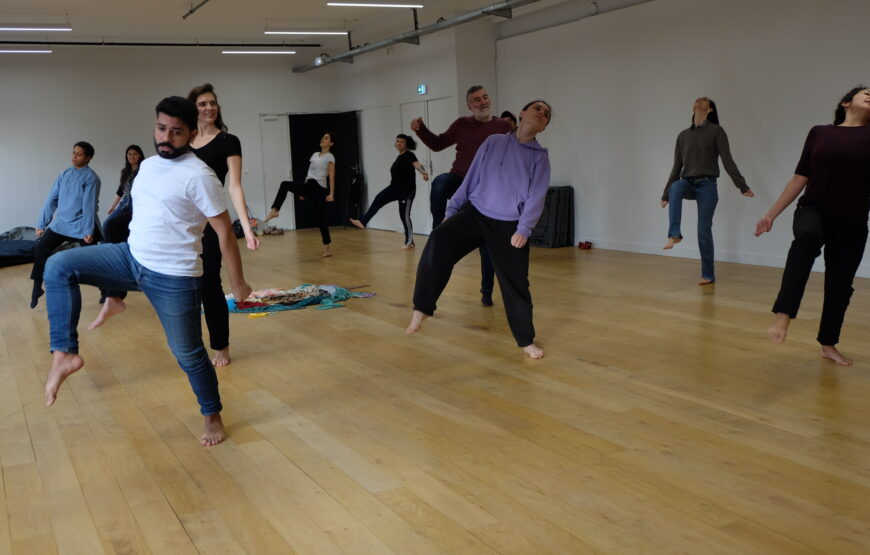
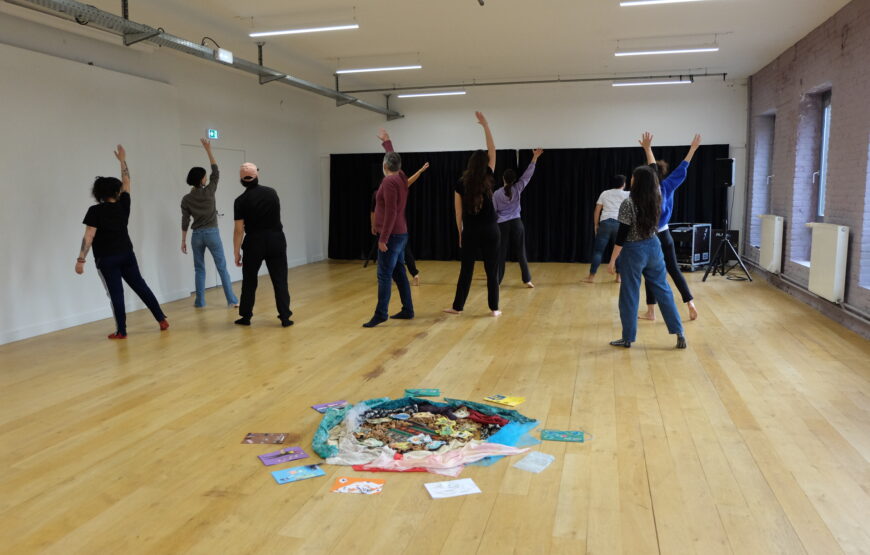
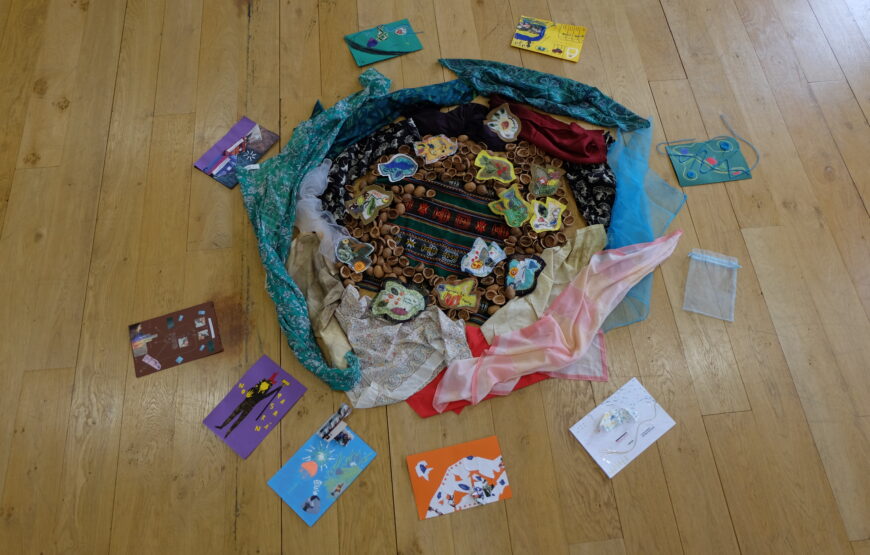
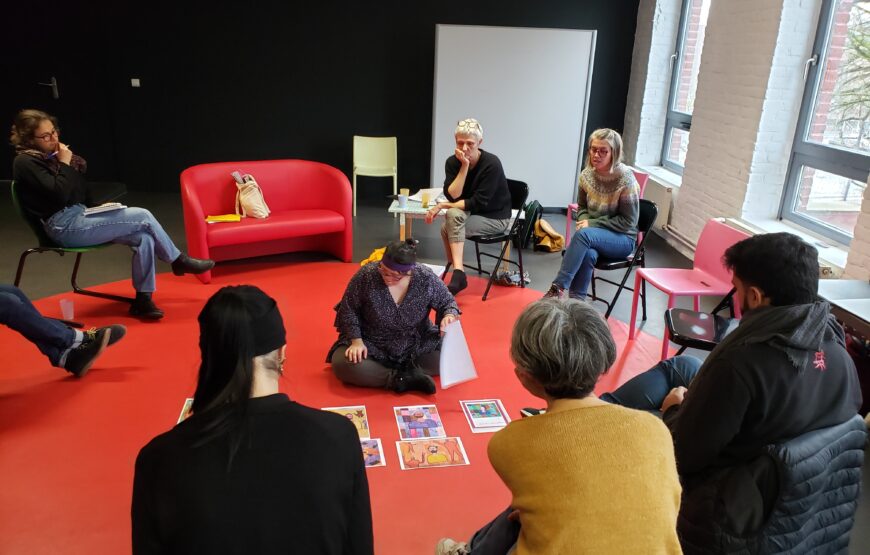
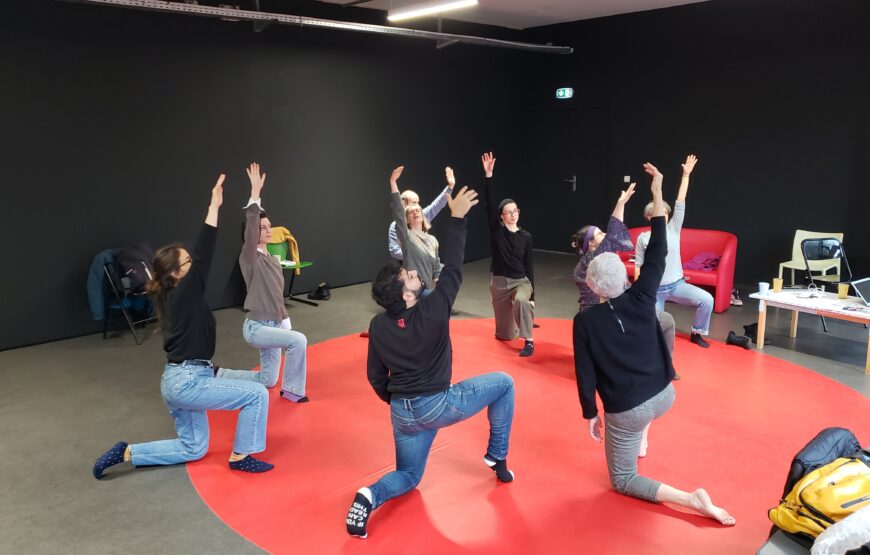

Latitudes Contemporaines is engaged in a new two-year European project, the Inclusive Soundscape project! Alongside Italian partners Project School and the city of Trepuzzi, philosopher and choreographer Fernando López is assisting Latitudes Contemporaines in setting up a series of workshops and co-design sessions aimed at promoting a more inclusive cultural environment.
Project supported by the European Union as part of the Erasmus+ programme.
10am — 1pm et 2pm — 5pm
Curation: Fernando López
From December 15 to 19, at maison Folie Wazemmes, Lille, Latitudes Contemporaines hosted one week of workshops and discussions around inclusion and cultural accessibility, open to participation for artists and (future) professionals of the cultural field.
Nine professionals and artists, invited by choreographer and philosopher Fernando López, offered five days of presentations on their various fields of expertise.
With Diane Villanueva & Edouard Liotard Khouri-Haddad, founders of cabaret La Velu.e
This workshop (presentation/discussion) offers an immersion into issues of diversity, artistic representation, gender and inclusivity.
The morning will focus on a presentation of our work, discussions and cultural references so that participants can discover how to integrate all these issues into their creative work.
Time will also be set aside for you to present your work so that we can help you integrate these concepts into your creative thinking or your current process.
The afternoon session will also include a practical component: similar to a role-playing game, we will ask you to create a mini-cabaret incorporating the issues discussed during the morning; catwalk/soul train exercises to explore each person’s uniqueness in a supportive environment.
The objective: to develop authentic, inclusive artistic expression that is conscious of its relationship with the audience.
Diane Villanueva is a singer, musician, performer, and co-founder of the Disorders Company and La Velu.e cabaret. She began her training at the Conservatory in classical dance and the Nadia Boulanger choir, then joined the master’s program at the CNR in Paris. In 2000, she decided to pursue a more comprehensive education and studied theater, dance, and singing at the Centre des Arts Vivants. In 2004, she met Leela Petronio (STOMP) and joined her company Hip Tap Project, with which she participated in several productions: Cirque du Soleil, Stomp, Tapage Nocturne (festival and residency at La Villette, Festival des Villes des Musiques du Monde, etc.), Sem’elles (residency and production at La Maison des Métallos and various festivals in France). At the same time, Diane worked with many artists, such as the singer Camille and her right-hand man Majiker on the 2008 tour, Koto Brawa (Burkinabe singer) in 2010, Zaza Fournier for the show Le Déluge in 2017, and others. In 2011, she met her two new collaborators, with whom she formed the electro-hip hop group Squid and The Stereo (various concerts in Paris and France). In 2017, she founded her French techno-song group: ÜGHETT. She writes the lyrics and composes with her right-hand men. The tone is set: a cabaret setting with Montmartre accents, full of cheekiness and eccentricity. In 2022, she co-founded the cabaret “La Velu.e” with other colleagues, for which she sings and hosts. They can be found at the Cirque Electrique and the Hasard Ludique every month and a half. For many years, Diane has been involved in sharing and passing on her multidisciplinary practice to various amateur audiences (schools, colleges, local people, prisons, detention centers, day hospitals, retirement homes, etc.).
Each encounter with these audiences is a new adventure that is both artistically and personally enriching.
Edouard Liotard Khouri-Haddad is a physical actor-performer, teacher, technical director, and lighting designer. He trained as an actor at Cours Florent and École Auvray-Nauroy. In theater, he has worked under the direction of Bruno Bernardin, Eram Sobhani, Julien Kosellek, and Lucie Berelowitch, among others; participated in public readings under the direction of François Béchu; and worked in radio under the direction of Roger Planchon. He has performed with choreographer Julien Desplantez, choreographer and dancer Emilia Giudicelli for Platon Jambon and Vivatus, Vivata, Vivatum, as well as in plays by Eram Sobhani: Léonce et Léna and Woyzeck, and Julien Kosellek for the play Le Dragon d’Or, alongside his own performance projects such as Suspension and Comment dire ? Assistant director to Cédric Orain for 10 years, he also created the lighting for the shows Je ne suis personne, directed by Guillaume Clayssen, La Prose du Transsibérien et de la petite Jehanne de France directed by Vincent Brunol, and Anatomy Titus Fall of Rome directed by Julien Varin, as well as Tu me dis que tu aimes les fleurs for Le pavillon hard. For more than 15 years, he has been teaching in schools and professional theater schools in France and Europe. For the past four years, he has also been technical director of the Festival de la Chaise-Dieu. More recently, he co-founded Cabaret La VELU.E. in 2022 with Üghett and DJs Fabisounours and Lokistarfish.
With Carlos Almela, cultural worker and author of Bastard Philanthropy, & Costa Badía, performer and consultant on cultural accessibility.
Vulnerable cosmologies. From exclusionary inclusion to radical support
Through the sharing of practical cases from the Spanish context, embodied experiences, the sharing of works of art and collective exercises, this session seeks to help us identify the limits of traditional cultural inclusion policies and move towards radical support for audiences and artists who are discriminated against because of their reduced mobility or visual or auditory diversity.
We will address the symbolic, architectural and functional dimensions that come into play in the relationship between the art world and corpo/neuro/divergent communities, in order to move beyond ticking boxes.
Costa Badía holds a bachelor’s degree in Fine Arts and a master’s degree in Art Education in Social and Cultural Institutions, both from the Complutense University of Madrid. She worked for four years in the educational department of the Reina Sofía National Art Museum in Madrid, where she was responsible for cultural mediation and programming for people with disabilities. She is currently involved in several projects, including an artist and educator residency at Matadero in Madrid, the design of a physical space dedicated to art and disability, various accessibility consulting assignments for art centers, and her doctoral studies in Fine Arts at the Complutense University of Madrid (UCM). She has presented performances at the Reina Sofía Museum, the Thyssen-Bornemisza Museum, the CA2M, the MUSAC, and Almacén in Lanzarote. She also gives lectures in various master’s programs and museums on cultural mediation and the inclusion of people with disabilities in cultural spaces. Her works are included in the collections of Ana de Alvear, Marina Vargas, and CA2M, among others. Her artistic approach aims to value error and challenge stereotypes of beauty and behavior. She explores alternative paths by studying the coexistence between normative and non-normative people.
Carlos Almela is a curator and cultural mediator, member of the Hablarenarte association, and author of the book Philanthropie bâtarde. He coordinates the master’s degree in cultural management at Carlos III University in Madrid, and is also director of hangar, an artistic production center (Barcelona), and member of the scientific council of Laboral, a center for artistic and industrial creation (Gijón). He holds degrees in political science (Sciences Po Paris), philosophy (Paris I – Sorbonne), and business administration, with a specialization in cultural management (ESCP Europe). Since 2013, he has been working at the intersection of art, education, and social action. Before joining hablarenarte, he directed the Citizen Art program of the Daniel and Nina Carasso Foundation in Spain, a philanthropic organization focused on social change. He is the author of the book Bastard Philanthropy. Author of For a Patronage Committed to Social Justice (2025), published by the Círculo de Bellas Artes, and editor of Vulnerable Cosmologies: Artistic Practices, Care, and Functional Diversity (2025), published by Catarata.
With Alice Davazoglou, choreographer, Françoise Davazoglou, teacher and founder of ART21, Mélanie Giffard, choreographic assistant, & Céline Luc, founder of the arts company À Ciel Ouvert.
The training day will provide an opportunity to explore Alice Davazoglou’s dance career and highlight the artistic and political issues it raises. Alice Davazoglou (choreographer), Céline Luc (artistic director and president of the A Ciel Ouvert company), Mélanie Giffard (choreographic assistant) and Françoise Davazoglou (accompanist and dance researcher) will take turns speaking to shed light on the various dynamics, encounters and stages that have marked this journey. Through experimentation, exchanges, testimonials and conceptual contributions, the various speakers will shed light on the inventions that were necessary to build Alice Davazoglou’s career, as well as the preconceptions and unspoken assumptions that still lead to a scarcity of creations by authors with mental disabilities.
Alice Davazoglou studied dance at the Laon Conservatory for twelve years. She then participated in numerous workshops (Agnès Coutard, Clara Cornil, Mylène Benoît, Mickaël Phelippeau, Cathy Polo, Xavier Lot, Blandine Minot, Laurence Pagès, etc.) as well as amateur choreographic projects such as Julie Nioche’s Sysiphes, Danse en chansons by Daniel Larrieu, and Planetary Dance by Hanna Halprin under the guidance of Clara Cornil. Since 2010, she has been attending regular dance workshops led by Nathalie Hervé, notably at the ART21 association, of which she is a founding member and vice president. Within ART21, she has been co-leading workshops for children in schools, after-school programs, and associations since September 2013. In 2017, she obtained accreditation from the French Ministry of Education to teach dance in primary schools. She has co-led workshops for teachers, educational advisors, assistants to children with disabilities, and Master’s students in dance at the University of Paris 8. She worked under the direction of Nathalie Hervé on the creation of a solo piece, Universalice, and she also dances in several of Nathalie Hervé’s pieces that originated in the ART21 choreography workshops. She is currently performing in Mickaël Phelippeau’s latest creation, a choreographic double portrait entitled De Françoise à Alice. She is the author of a two-volume work, Je suis trisomique normale mais ordinaire (I am normal but ordinary with Down syndrome) and Je suis Alice Davazoglou (I am Alice Davazoglou), published in November 2020, for which she received a dance research grant from the Centre National de la Danse in Pantin. Based on the portraits in her book, in September 2024 she created Danser ensemble (Dancing Together), her first piece as a choreographer, for which she brought together 10 renowned choreographers as performers.
Céline Luc and Alice Davazoglou met in 2007 at L’échangeur / CDCN des Hauts-de-France, where Céline was in charge of regional relations and Alice was an amateur dancer in Laon. They met through various artistic and cultural education projects, particularly teacher training programs for current and future teachers led by Françoise Davazoglou at the IUFM. In 2013, Céline took over coordination and administration for the Petites Scènes Ouvertes network. At the same time, she helped create La Ruse, a company supporting Bérénice Legrand’s choreographic projects. As treasurer, she handled the administrative side of things until June 2017, when she became an employee of the association. In September 2019, she took on the role of general secretary and is responsible for developing activities, while continuing her work with the Les Petites Scènes Ouvertes network as production director. At the same time, she is following the activities and career of Alice Davazoglou in Laon (within the ART21 association) and then in creation and on tour with Mickaël Phelippeau. In 2022, inspired by Alice’s strong desire to become a choreographer, Céline co-founded A Ciel Ouvert, an association whose purpose is to promote, support, and raise awareness of projects by artists with mental disabilities. She serves as the association’s president. The association’s first project is Alice’s Danser Ensemble, a show that premiered in September 2024 and is currently on tour. The association’s activities revolve around supporting Alice’s professional career as a choreographer.
Françoise Davazoglou is a primary school teacher and trainer. She became involved in dance, alongside her own enthusiastic amateur practice, through the “Dance at School” projects and training courses initiated by Marcelle Bonjour. In 2002, she became a “dance resource person” at the IUFM (University Institute for Teacher Training) and then at the ESPE (Higher School of Teaching and Education) in Laon. She has led projects for both elementary school students and teachers in initial or continuing training. Since 1998, she has been working closely with L’Echangeur, CDCN des Hauts de France, to set up artistic and cultural education programs. These projects have provided opportunities to collaborate with numerous dancers and choreographers (Laurence Bertagnol, Catherine Contour, Karine Ponties, Clara Cornil, Marinette Dozeville, Pal Frenak, Daniel Larrieu, Xavier Lot, Cathy Polo, Luc Petton, Laurence Rondoni, Cie Irène Tassembedo, Mickaël Phelippeau, Mié Coquempot, etc.). Since 2010, she has been enrolled in a university program at Paris 8 University and defended her thesis, “Dance and Disability: What Powers to Act?” under the supervision of Isabelle Ginot in February 2015. This research questions the processes that enable dancers with and without disabilities to work, think, and create together, and attempts to identify the powers to act on the “disabled condition” that these processes can develop. Since 2013, she has been involved in projects with ART21, an association of which she is a founding member and which aims to encourage and promote the practices of dancers with mental disabilities. Since 2020, she has been performing in Mickaël Phelippeau’s choreographic double portrait, De Françoise à Alice.
In 2008, Mélanie Giffard joined the ‘From Performer to Author’ training programme at the CCN in Rillieux-la-Pape, directed by Maguy Marin. In 2011, she danced for Maud Le Pladec in Democracy. That same year, she joined the CCN in Caen/Basse-Normandie, directed by Héla Fattoumi and Eric Lamoureux, as a dancer for the productions Circle and Lost in Burqa. Mélanie has been dancing with Herman Diephuis since 2012 in the productions Ciao Bella, All of Me, Impressions, Bang!, Clan and Impressions, Nouvel accrochage. In 2013, she worked with Liz Santoro and Pierre Godard in We Do Our Best and with Julien Jeanne in Parade. In 2015, she reprised her role in Mon amour by director Thomas Ferrand. In 2016, she obtained her State Diploma in Contemporary Dance and, at the same time, developed a passion for traditional Chinese medicine, particularly tuina and qigong. In 2021, she joined the company of Alban Richard, director of the CCN in Caen, for his creation 3 Works for 12, as well as for the performances The Weird Sisters Project and Buées et Exalte. For the past eight years, she has been involved in creating dance forms within various structures: secondary schools, primary schools, medical-educational institutes, theatre conservatories, university departments of sports science, etc.
With Valentina Morales, choreographer and dance scholar.
‘Encountering our bodies as territories: dances of encounter’
The workshop offers an opportunity to experiment with a series of fundamental movements from two ‘dances of encounter’ from South America, namely the cueca and the tinku.
These dances approach inter-bodily encounters in almost opposite ways, but share a feminist and decolonial perspective, obscured by the history of nation states, which we can consider through the notion of the body-territory. At the heart of Latin American ecofeminist thought, the notion of ‘body-territory’ is marked by a relational logic: when territories, as earth-ground, intertwine with dancing bodies. Thus, the word ‘territory’ does not only have a possessive or geopolitical meaning, but rather an idea of ‘terroir’, a sense of belonging to our places of origin and those we inhabit today.
In 1979, the cueca was proclaimed the ‘national dance’ by the Chilean military government. This imposed a restrictive choreographic structure, gender stereotypes and symbolic violence towards women. Beyond these constraints, we can understand this dance through the diversity of territories and cultures that dance the cueca. This is especially true given its transnational origins, resulting from the encounter between South America, Africa and Europe (mainly Andalusia, with musical and choreographic influences from French Baroque), which produced significant variations between Chile, Argentina, Peru and Bolivia.
‘Tinku’ means ‘encounter’ in Aymara and refers to a complex ritual, originating in Bolivia, in which the participants, mostly male, fight to the blood, used as an offering to the earth. But its dance, also performed by women, expresses more of a juxtaposition of indigenous, European, migrant, rural and urban cultural elements in which the indigenous aspect of miscegenation is asserted through an aesthetic of resistance that is also beginning to take on a feminist and transnational dimension.
Through practice and viewing video clips of different manifestations of these dances, we will explore rhythms, spatialities and gestural qualities, beyond the mere folkloric imagery they impose. At the same time, in order to understand their decolonial and situated dimension, we will work on mapping our body-territories, which will serve as a basis for individual narratives and gestural research.
Valentina Morales, born in 1985 in Santiago, Chile, trained in contemporary dance, choreography, and teaching at the Espiral school (formerly UAHC), founded by Patricio Bunster and Joan Turner. In 2010, she began working as an independent choreographer and dancer and won the Chilean National Arts Fund (Fondart) for the creation of the interdisciplinary work “Un Viaje a Macondo” (2011), inspired by Gabriel García Márquez’s novel “One Hundred Years of Solitude.” In 2011, she moved to France to pursue a master’s degree in the Dance Department at Paris 8 University. Under the supervision of Isabelle Ginot, she devoted herself to research on the aesthetics of Pina Bausch’s (1940-2009) dance. In 2013, she received a Chilean ANID national scholarship to continue her work through a doctoral thesis. In June 2019, she obtained a PhD in Dance and Gestural Arts with a thesis entitled Une corporéité de la solitude. Pour une esthétique de la danse de Pina Bausch (A Corporeality of Solitude: Towards an Aesthetic of Pina Bausch’s Dance) and became an associate researcher with the “Dance, Gesture, and Corporeality” (MUSIDANSE) team at Paris 8 University. In January 2020, she founded the art and ecology collective “Pareidolia” with Hugo Cordeau. In 2022, she began a postdoctoral project entitled “Los tránsitos de un gesto” (MUSIDANSE, C ND, aCD), which studies choreographic transfers between Chilean and German dance through the Jooss-Leeder system. Since 2022, she has been teaching in the Dance Department at the University of Lille and is currently developing a research-creation project devoted to the notion of body-territory, based on two South American encounter dances: the cueca and the tinku, and the different ways of dancing (with) plants.
With Juliana Marín Taborda, visual artist, teacher and researcher focusing on social transformation through art.
This workshop explores co-creation practices with vulnerable populations, particularly those from migrant backgrounds, combining theory and experimentation. We will first lay the theoretical and practical foundations for the aesthetic power of everyday gestures, considered as performative acts that enable us to work with non-artists and reveal the creativity present in the simple gestures of everyday life. We will then address the ethical principles of research-creation applied to the performing arts, based on the frameworks developed in the European TransMigrARTS project, by presenting the establishment of an ethical and bioethical space for care and well-being structured in three stages: before the workshop (preparation of the conditions for the encounter), during the workshop (attention and precautions necessary for conducting a performing arts workshop) and after the workshop (future prospects, extensions and post-creation care). The entire workshop will alternate between theory and practice and will conclude with a group discussion to share experiences, feelings and avenues for further research opened up by the session.
Juliana Marín Taborda is a visual artist, teacher, and researcher. She is currently pursuing a double doctorate in arts and philosophy at the University of Antioquia and the University Jean Jaurès in Toulouse. She has taught at the University of Antioquia and the University of San Buenaventura. She has coordinated cultural projects focused on research-creation and social transformation through art. Her work has been exhibited in Colombia and Europe. She has received several awards, including the ICETEX Artistas Jóvenes Talento scholarship and an honorable mention for her thesis at the University of Antioquia. She has published several articles on research-creation, rhizome thinking, and photographic arrangements, and has contributed to the book “Applied Research-Creation. Innovating from Art for Social Sectors.” She is currently participating in TransAtlantic projects such as TransMigrArts, a Horizon 2020-MSCA RISE project, and ARMEP, an Ecos Nord project.
Fernando López (Madrid, 1990) is a dancer, choreographer, and philosopher. With a PhD in Aesthetics from Paris 8-Saint Denis University, he combines artistic activity, academic research, and teaching. Since 2009, he has directed his own contemporary flamenco company, creating more than ten shows in which dance, words, and music intertwine, transcending all labels. Highlights include “Danser dans l’homme” (2015), “Penseur, un philosophe dans le tablao” (2018), “Le mouvement” (2021), “Plus de versions: El Amor Brujo” (2021), and “Flamenco noir” (2023). His creations have been performed by artists such as Álvaro Romero, Jero Férec, Belén Maya, La Chachi, Carmen Muñoz, and Isabel Do Diego, among others. He has also been sought after as an artistic director and advisor by choreographers such as Olga Pericet, Belén Maya, Juan Carlos Lérida, José Manuel Álvarez, Poliana Lima, Carmen Muñoz, Paula Quintana, Eyas Dance Project, Sara Torres, Acerina Amador, Paula Bruna, etc. Among other distinctions, he received the award for best dancer at the El Álamo competition (2010) and the DanceWeb scholarship (2013) from the ImpulsTanz festival in Vienna. Since 2020, he has been a member of the Spanish Academy of Performing Arts and a visiting professor at various universities in Spain and France, where he teaches theoretical and practical workshops focused on research-creation and gender issues in dance. His publications include Historia queer del flamenco (Egales, 2020), which was translated into French (L’Arche) and English (Michigan University Press) in 2024.
